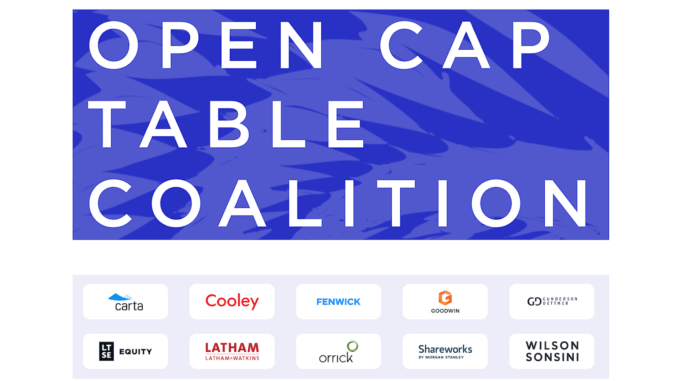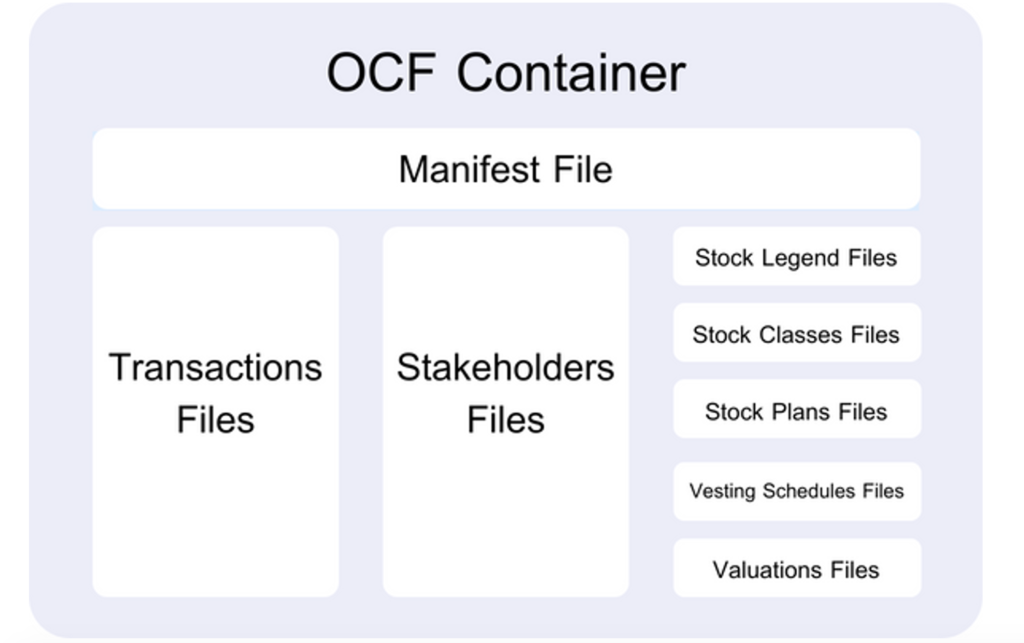
In a very significant example of key players in the legal market coming together with other stakeholders to solve a shared problem, the Open Cap Table Coalition’s first iteration of the Open Cap Table Format (OCF), has been released, bringing benefits to the entire startup sector.
The OCF is an open source and standardised approach to startup cap table data designed to help drive interoperability, transparency, and portability. The challenge has been that everyone makes cap tables (the information showing who owns what part of a company and in what form) in their own way. This slows down deals and makes life way more complicated than it needs to be for all involved in the startup and investment world.
The launch of the standardised solution is all the more impressive when you see the firms and other parties involved in the Coalition, from Gunderson Dettmer, Wilson Sonsini, Cooley, Orrick, Latham, Goodwin, and Fenwick, among others on the law firm side, to companies such as Shareworks, which is part of Morgan Stanley, LTSE Equity the capital markets infrastructure company, and Carta the equity management platform, and many more.

‘Since announcing the Coalition in July 2021, we have fostered a growing community that is working together to create standardization around the ways we interact with one of the most basic documents in running a business: the capitalization table. Today, the first version of a standardized format to communicate capitalization data between stakeholders is now open source and ready for ecosystem players to interact with and adopt,’ the Coalition said.
As to the technical side of things, Artificial Lawyer recommends having a look at the website and/or the Github page, as there is a lot there. But, in brief:
‘In its most simple terms, the OCF allows for cap table data to be organized and stored as a series of JSON files:
- Manifest file — Each OCF object will contain a “manifest file” which will provide detailed information on the issuer, including Tax IDs, addresses, contact information, and date of creation.
- Transaction files — Each of our security types (think stock, warrants, etc.) has its own set of transaction event types. Transaction events, including issuances, are stored in transaction files from earliest to most recent.
- Stakeholder files — Stakeholder files are not just limited to shareholders and optionees. These can also include board members, advisors, officers, and other stakeholders.
Other files that are also included describe stock legends, stock classes, stock plans, vesting schedules, and valuations.’

As noted, as well as being technically a significant step forward, what is especially noteworthy is how law firms – which are often competitors – have worked closely together through the Coalition to help the market as a whole.
The firms will also benefit in turn as working on a standard cap table with shared tech specs will make life easier for the lawyers at those firms as they try and serve their clients, from the startups, to the investors and other stakeholders.
In short, it’s a great example of a more community-based approach to the legal market where a ‘common good’ is created. How many other areas of the legal map could see the same kind of approach….?

Commenting on the move, John Scrudato (above), Legal Engineering and Data Strategy Manager, Gunderson Dettmer, told Artificial Lawyer: ‘The Open Cap Table Coalition’s first public release of the Open Cap Format (OCF) represents a ground-breaking achievement in collaborative innovation – perhaps the first time that a group of major law firms and technology companies have come together to successfully co-develop and release open source software.
‘It’s so much more than just open source software, though. It’s a proof of concept that collaborative innovation works in legal. Law firms and vendors can work together to solve problems none of them can solve alone.
‘OCF enables law firms and software vendors to achieve seamless integrations at a far lower cost than is possible today. Now we can build software tools to a single standard rather than designing and building every custom software tool or integration to a separate, often-proprietary standard. This radically reduces the cost of building such integrations, and, as a result, changes the build vs buy equation, making it far cheaper and easier for law firms to build custom logic and customizations to use capitalization data in the service of their clients.
‘OCF has benefits for companies too. Not only does it streamline our representation of them, but it allows them maximum portability of their critical information. This is important because they aren’t beholden to one provider throughout their lifecycle, giving them more control and, ultimately, better service.
‘Gunderson was a founding member of the Coalition and has generously contributed engineering and attorney time because we believe that the frictionless world OCF enables is good for the industry and good for our clients.’

While David Wang (above), Chief Innovation Officer at Wilson Sonsini, told Artificial Lawyer: ‘I think the most interesting nexus point is this significant overlap between Fintech, legal tech, and corporate law that’s evident from the parties around the table here.
‘This intersectionality is, at its heart, why OCF is not really about time savings/risk reduction per se (though there is plenty of that to be had, e.g. in the diligence/cap tie out process), but rather the legal industry actively participating in the digital transformation of the fintech/equity space.
‘OCF will enable everyone to talk to everyone else in the same digital language. Without this common language, everyone, especially law firms, will be stuck with the current status quo, which is that each firm and each vendor needs to invest significant time/effort to be able to effectively work together digitally, if they can do so at all.
‘Now that we have v1.0 of the format, anyone can, in an open sourced way, start to develop tooling around this standard. Many of the members of the Coalition already have efforts in-flight.
‘The most gratifying thing for me is to see all our peer firms participating actively in this process because we all at the end of the day share the common interest of protecting and servicing our clients. This is something they need and we can only deliver it if we work together.’
So, there you go. And this is just the first iteration. Rather like we have seen with other standardisation projects such as oneNDA or the work of Bonterms, this is just the beginning and things will evolve.
To conclude, and as highlighted, this is a very welcome and positive step that shows law firms can work very closely together for the good of all. The next question is: what other common challenges can be solved next?
—
Note: If you’re interested in joining the coalition, you can email join@opencaptablecoalition.com